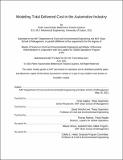| dc.contributor.advisor | Caplice, Chris | |
| dc.contributor.advisor | Simchi-Levi, David | |
| dc.contributor.author | Queiros, Pedro Vasconcelos Bettencourt Teixeira | |
| dc.date.accessioned | 2022-01-14T14:55:47Z | |
| dc.date.available | 2022-01-14T14:55:47Z | |
| dc.date.issued | 2021-06 | |
| dc.date.submitted | 2021-06-10T19:13:23.942Z | |
| dc.identifier.uri | https://hdl.handle.net/1721.1/139191 | |
| dc.description.abstract | Automotive part sourcing is a large scale complex problem that involves the procurement of thousands of individual parts from hundreds of different suppliers. This project focuses on the development of a new Total Delivered Cost (TDC) methodology for automotive part sourcing at Nissan. Initially, a calculation methodology was developed using operational data from the Nissan Smyrna plant. This methodology, which aims at capturing the direct and indirect costs of sourcing, comprises 10 different cost drivers including part, tooling, packaging, transportation, last mile, storage, inventory, obsolescence, quality, and tariff. Subsequently, the methodology was integrated in a TDC tool for ease of use and applied in a preliminary TDC analysis. The results show that: (1) part cost is the main driver of TDC with 90% of parts studied having non-part cost less than 15% of TDC; (2) non-part cost has an important compounding effect due to correlation between transportation, last mile, storage, inventory, obsolescence, and pipeline quality costs; (3) the relation between available information, TDC accuracy, and TDC value is highly asymmetric across time. Overall, the results highlight the importance of TDC methodologies in improving automotive part sourcing. Lastly, a review of typical implementation challenges associated with TDC methodologies was performed with the objective was identifying strategies that increase business impact. Two strategies were investigated including adopting a gradual implementation plan to mitigate the negative impact of initial low TDC accuracy and deploying TDC methodologies as filter in the sourcing process to reduce workload and allow for better resource allocation. The incorporation of cost of complexity and cost of supply chain risk in TDC is discussed as future work. | |
| dc.publisher | Massachusetts Institute of Technology | |
| dc.rights | In Copyright - Educational Use Permitted | |
| dc.rights | Copyright retained by author(s) | |
| dc.rights.uri | https://rightsstatements.org/page/InC-EDU/1.0/ | |
| dc.title | Modeling Total Delivered Cost in the Automotive Industry | |
| dc.type | Thesis | |
| dc.description.degree | S.M. | |
| dc.description.degree | M.B.A. | |
| dc.contributor.department | Sloan School of Management | |
| dc.contributor.department | Massachusetts Institute of Technology. Department of Civil and Environmental Engineering | |
| mit.thesis.degree | Master | |
| thesis.degree.name | Master of Science in Civil and Environmental Engineering | |
| thesis.degree.name | Master of Business Administration | |
